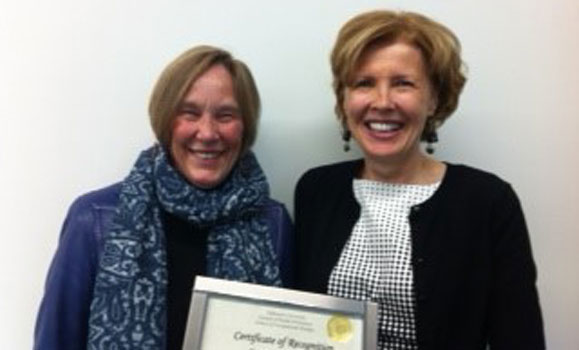News
» Go to news mainOccupational Therapy welcomes Dr. Johanne Desrosiers: First recipient of the Townsend Fellowship in Occupation and Society

Dalhousie's School of Occupational Therapy recently welcomed Dr. Johanne Desrosiers as the first Townsend Fellow in Occupation and Society.
The Townsend Fellowship was established in honour of Professor Emerita Elizabeth Townsend - an internationally recognized occupational therapist and occupational scientist committed to inclusion, justice and human rights. Dr. Townsend was a founding faculty member of the School of Occupational Therapy, and was appointed as Director from 1997 to 2010.
Dr. Desrosiers was a natural choice for the Townsend Fellowship - an accomplished occupational therapist and researcher, who has received the prestigious Muriel Driver Lectureship from the Canadian Association of Occupational Therapists, her work on understanding and overcoming older adults' restrictions in daily activities and social interactions has much in common with Dr. Townsend's commitment to inclusion and social justice. As Professor and Vice Dean of Student Life, as well as Secretary of the Faculty of Medicine and Health Sciences at the Universite de Sherbrooke - Dr. Desrosier's also shares Dr. Townsend's commitment to leadership.
One aim of the Fellowship is galvanizing scholarship in the School by investigating questions related to every day occupations and their societal contexts. To accomplish this, Dr. Desrosiers presented the public lecture "Participation Following Stroke" which explored the lasting impact of occupational therapy on the everyday lives of those who have suffered a stroke, and challenged the audience to think of how the profession can help improve lives in terms of gaps in services, the accomplishment of social roles and the maintenance of good mental health. Dr. Desrosiers was also involved with a team of researchers at Dalhousie providing support as they analyzed data related to the participation of people with neurological conditions in daily activities.
Recent News
- Applications open for Leon & Rose Zitner Prize
- Practicing what we preach: The importance of leisure and recreation for those who study, teach and work in health
- Dal Health announces new Associate Dean, Equity and Inclusion
- New Director announced for College of Pharmacy
- PhD in Health candidate recognized for her innovation in cancer research
- Dal Health’s School of Nursing to offer Atlantic Canada’s First Master of Nursing, mental health and addictions
- Dr. Catherine Mah is taking aim at social impacts on food purchasing and diet
- Faculty of Health research project finds creative culmination in Nocturne 2023 exhibit
